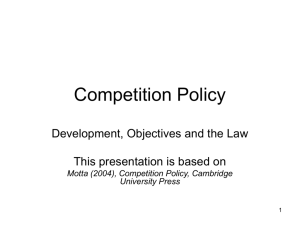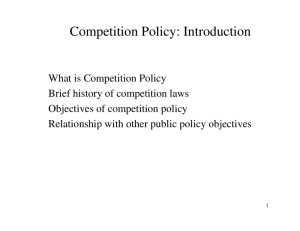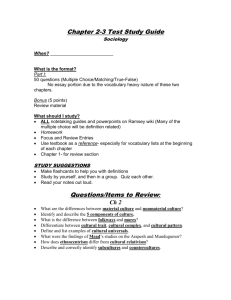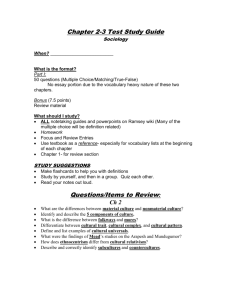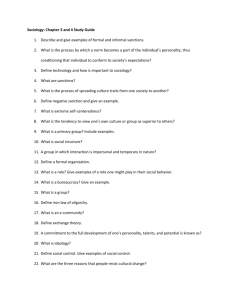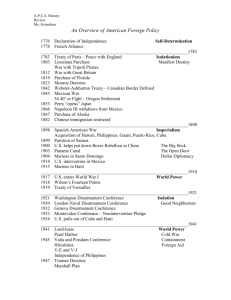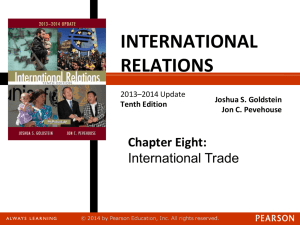EU and German Competition Law I (Basics, Cartels, Sanctions)
advertisement
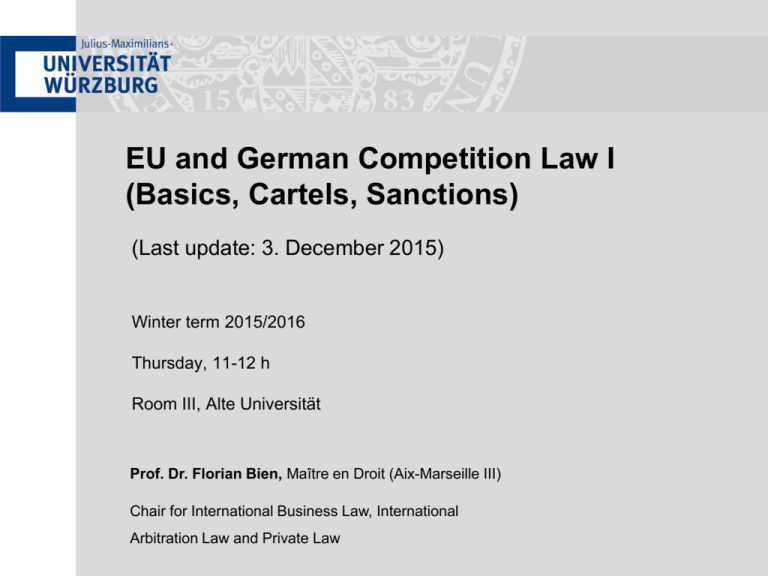
EU and German Competition Law I (Basics, Cartels, Sanctions) (Last update: 3. December 2015) Winter term 2015/2016 Thursday, 11-12 h Room III, Alte Universität Prof. Dr. Florian Bien, Maître en Droit (Aix-Marseille III) Chair for International Business Law, International Arbitration Law and Private Law EU and German Competition Law I: Basics, Cartels, Sanctions I. Introduction to Competition Law EU and German Competition Law I: Basics, Cartels, Sanctions “Thales [of Miletus, c. 624 – c. 546 BC], so the story goes, because of his poverty was taunted with the uselessness of philosophy; but from his knowledge of astronomy he had observed while it was still winter that there was going to be a large crop of olives, so he raised a small sum of money and paid round deposits for the whole of the olive-presses in Miletus and Chios, which he hired at a low rent as nobody was running him up; and when the season arrived, there was a sudden demand for a number of presses at the same time, and by letting them out on what terms he liked he realized a large sum of money, so proving that it is easy for philosophers to be rich if they choose, but this is not what they care about. Thales then is reported to have thus displayed his wisdom, but as a matter of fact this device of taking an opportunity to secure a monopoly is a universal principle of business; […]” (Aristotle (384 - 322 BC), Politics, Book 1, Chapter 11, Section 1259a) (http://data.perseus.org/citations/urn:cts:greekLit:tlg0086.tlg035.perseus-eng1:1.1259a) EU and German Competition Law I: Basics, Cartels, Sanctions Olive-presses Miletus A Chios B D C Olivefarmers 1 2 3 R1 X X 4 R2 X X 5 Retailer Final consumers 6 R3 X X X X EU and German Competition Law I: Basics, Cartels, Sanctions Olive-presses Miletus A Chios B D C Olivefarmers 1 2 3 R1 X X 4 R2 X X 5 Retailer Final consumers 6 R3 X X X X EU and German Competition Law I: Basics, Cartels, Sanctions Olive-presses Miletus A Chios Monopoly B D C Olivefarmers 1 2 3 R1 X X 4 R2 X X 5 Retailer Final consumers 6 R3 X X X X EU and German Competition Law I: Basics, Cartels, Sanctions Olive-presses Miletus A Chios B D C Cartel Cartel Olivefarmers 1 2 3 R1 X X 4 R2 X X 5 Retailer Final consumers 6 R3 X X X X EU and German Competition Law I: Basics, Cartels, Sanctions Olive-presses Miletus A B D C Vertical merger Olivefarmers 1 2 3 R1 X Chios X 4 R2 X X 5 Retailer Final consumers 6 R3 X X X X EU and German Competition Law I: Basics, Cartels, Sanctions Cf. Art. 102 TFEU “Emperors Zeno to Constantinus, City Prefect. (Codex Iustinianus, 4, 59, 2) Cf. Art. TFEU We order that no one shall have101 a monopoly […] of any kind of cloth, fish […] or of any other article […] (cartel, used forprice any fixing) other purpose; nor shall anyone swear or agree in any unlawful meeting not to sell the various articles of commerce for Cf. Art. 101 TFEU less than the price agreed on. (cartel,[…] market sharing) 1. Building artificers also and contractors are entirely forbidden to agree Sanctions fornot abuse among themselves not to complete any work let to someone else, or to of a monopoly interfere in any undertaking put in charge of another […] 2. And if anyone shall dare to carry on any monopoly, his goods shall be confiscated and he shall be sent into perpetual exile. Sanctions for cartels 3. If the chiefs, moreover, of the various trades hereafter dare to make (Public) enforcement agreements as to fixing prices of things, or if they enter into and bind of competition law be punished themselves by any other illegal contracts, we decree that they shall by a fine of fifty pounds of gold. […] Your official staff will be punished by a fine of forty pounds of gold, if condemnations pursuant to our salutary order for prohibited monopolies and forbidden agreements of guilds are not, perchance, inflicted by reason of any venality, dissimulation, or some other disobedience of duty. EU and German Competition Law I: Basics, Cartels, Sanctions Cf. Art. 102 TFEU “Emperors Zeno to Constantinus, City Prefect. (Codex Iustinianus, 4, 59, 2) Cf. Art. TFEU We order that no one shall have101 a monopoly […] of any kind of cloth, fish […] or of any other article […] (cartel, used forprice any fixing) other purpose; nor shall anyone swear or agree in any unlawful meeting not to sell the various articles of commerce for Cf. Art. 101 TFEU less than the price agreed on. (cartel,[…] market sharing) 1. Building artificers also and contractors are entirely forbidden to agree Sanctions fornot abuse among themselves not to complete any work let to someone else, or to of a monopoly interfere in any undertaking put in charge of another […] 2. And if anyone shall dare to carry on any monopoly, his goods shall be confiscated and he shall be sent into perpetual exile. Sanctions for cartels 3. If the chiefs, moreover, of the various trades hereafter dare to make (Public) enforcement agreements as to fixing prices of things, or if they enter into and bind of competition law be punished themselves by any other illegal contracts, we decree that they shall by a fine of fifty pounds of gold. […] Your official staff will be punished by a fine of forty pounds of gold, if condemnations pursuant to our salutary order for prohibited monopolies and forbidden agreements of guilds are not, perchance, inflicted by reason of any venality, dissimulation, or some other disobedience of duty. EU and German Competition Law I: Basics, Cartels, Sanctions II. Extraterritorial reach and enforcement of competition law EU and German Competition Law I: Basics, Cartels, Sanctions Mergers Cartel Abuses of a dominant position EU and German Competition Law I: Basics, Cartels, Sanctions Effects Doctrine (Alcoa-Case, 148 F.2d 416 (2d Cir. 1945)) … allows for jurisdiction over foreign offenders and foreign conduct, so long as the economic effects of the anticompetitive conduct are experienced on the domestic market Cf. § 130 Abs. 2 GWB (German Code against Restraints of Competition): „Dieses Gesetz findet Anwendung auf alle Wettbewerbsbeschränkungen, die sich im Geltungsbereich dieses Gesetzes auswirken, auch wenn sie außerhalb des Geltungsbereichs dieses Gesetzes veranlasst werden.“ Implementation test (Court of the European Union) … measures the impact of a anticompetitive behavior originating from outside the EU for the European market EU and German Competition Law I: Basics, Cartels, Sanctions InnoLux Corp. (TWN) LCD-Panel producers manufacturers of televisions and computers a EU final products LCD LCD LCD 100 % subsidiary B C (TWN) final products final products final consumer EU and German Competition Law I: Basics, Cartels, Sanctions 1. LCD-Cartel Judgment of the Court of 9 July 2015 (Case C-231/14 P) InnoLux Corp. v. Commission Cartel of six Korean and Taiwanese producers of liquid crystal display panels (LCD panels) which are the main component of flat screens used in televisions and computers Three different ways of distribution of the cartelized panels : - direct sales into the EU (to European manufacturers of televisions and computers) - direct sales into the EU of the final products (televisions, computers) manufactured by subsidiaries of the members of the cartel - sales into the EU of the final products (televisions, computers) manufactured by third parties outside the EU EU and German Competition Law I: Basics, Cartels, Sanctions 2. Abuse of a dominant position by INTEL Corp. Commission decision of 13 May 2009 against Intel Corp.: Abuse of a dominant position by - granting rebates to PC manufacturers such as Dell, HP and Lenovo conditional on them obtaining all or almost all of their supplies in processors from Intel Corp., - making direct payments to an important downstream computer retailer (“Media Markt”) conditional on it only selling PCs with Intel processors only EU and German Competition Law I: Basics, Cartels, Sanctions AMD rebate „Direct payments“ INTEL DELL HP Media-Saturn (MSH) final consumer Nec Acer other retailers IBM EU and German Competition Law I: Basics, Cartels, Sanctions 3. Merger Merger of Boeing and McDonnell-Douglas - Cleared by the FTC (US) on 1 July 1997 - Cleared subject to conditions and requirements by the European Commission on 31 July 1997 EU and German Competition Law I: Basics, Cartels, Sanctions III. The relationship between national and EU competition law EU and German Competition Law I: Basics, Cartels, Sanctions Council Regulation 1/2003 Article 3 – Relationship between Articles 81 and 82 of the Treaty and national competition laws 1. Where the competition authorities of the Member States or national courts apply national competition law to agreements, decisions by associations of undertakings or concerted practices within the meaning of Article 81(1) of the Treaty which may affect trade between Member States within the meaning of that provision, they shall also apply Article 81 of the Treaty to such agreements, decisions or concerted practices. Where the competition authorities of the Member States or national courts apply national competition law to any abuse prohibited by Article 82 of the Treaty, they shall also apply Article 82 of the Treaty. 2. The application of national competition law may not lead to the prohibition of agreements, decisions by associations of undertakings or concerted practices which may affect trade between Member States but which do not restrict competition within the meaning of Article 81(1) of the Treaty, or which fulfil the conditions of Article 81(3) of the Treaty or which are covered by a Regulation for the application of Article 81(3) of the Treaty. Member States shall not under this Regulation be precluded from adopting and applying on their territory stricter national laws which prohibit or sanction unilateral conduct engaged in by undertakings. EU and German Competition Law I: Basics, Cartels, Sanctions Council Regulation 1/2003 Article 3 – Relationship between Articles 81 and 82 of the Treaty and national competition laws 1. Where the competition authorities of the Member States or national courts apply national competition law to agreements, decisions by associations of undertakings or concerted practices within the meaning of Article 81(1) of the Treaty which may affect trade between Member States within the meaning of that provision, they shall also apply Article 81 of the Treaty to such agreements, decisions or concerted practices. Where the competition authorities of the Member States or national courts apply national competition law to any abuse prohibited by Article 82 of the Treaty, they shall also apply Article 82 of the Treaty. Regulation 1/2003, Article 3 (1): 2. The application of national competition law may not lead to the prohibition of National competition authorities (NCA) and national courts not only agreements, decisions by associations of undertakings or concerted practices which power, butMember even the obligation to apply competition law within may have affect the trade between States but which do notEU restrict competition to conduct which falls scope of Articles 101 (restrictive the meaning of Article 81(1)within of the the Treaty, or which fulfil the conditions of Article 81(3) and TFEUby(abuse of a dominant position) of theagreements) Treaty or which are102 covered a Regulation for the application of Article 81(3) of the Treaty. Member States shall not under this Regulation be precluded from adopting and applying on their territory stricter national laws which prohibit or sanction unilateral conduct engaged in by undertakings. EU and German Competition Law I: Basics, Cartels, Sanctions Council Regulation 1/2003 Article 3 – Relationship between Articles 81 and 82 of the Treaty and national competition laws1/2003, Article 3 (2): Regulation Relationship between EU and national competition law: 1. Do Where the competition authorities of the Member Stateslaws or national courts apply national authorities may apply stricter national to agreements ornational competitionconduct? law to agreements, decisions by associations of undertakings or concerted unilateral within the meaning ofbyArticle 81(1) the Treaty which may affect trade practices Agreements authorized article 101ofTFEU between Member within by thenational meaning law of that provision, they shall also apply …must not beStates prohibited Article 81 of the Treaty to such agreements, decisions or concerted practices. Where Unilateral conduct which does not constitute an abuse of a dominant the competition authorities of the Member States or national courts apply national position law within theabuse meaning of article 102 TFEU competition to any prohibited by Article 82 of the Treaty, they shall also apply …may be prohibited or sanctioned by stricter national laws. Article 82 of the Treaty. 2. The application of national competition law may not lead to the prohibition of agreements, decisions by associations of undertakings or concerted practices which may affect trade between Member States but which do not restrict competition within the meaning of Article 81(1) of the Treaty, or which fulfil the conditions of Article 81(3) of the Treaty or which are covered by a Regulation for the application of Article 81(3) of the Treaty. Member States shall not under this Regulation be precluded from adopting and applying on their territory stricter national laws which prohibit or sanction unilateral conduct engaged in by undertakings. EU and German Competition Law I: Basics, Cartels, Sanctions EU law National law Actual result Regulation 1/2003 Art. 101 TFEU + + + „agreements, concerted practices“ - - - - + - Art. 3 I 1 + x + Art. 3 II 1 Art. 102 TFEU + + + „unilateral conduct of a dominant firm“ - - - - + - Art. 3 I 2 + - - Art. 3 II 2 + = prohibition (strict competition law) - = permission (less strict competition law) EU and German Competition Law I: Basics, Cartels, Sanctions CJEU, Judgment of 9 September 2003 Case C-198/01 - Consorzio Industrie Fiammiferi (CIF) v. Autorità Garante della Concorrenza e del Mercato By Royal Decree No 560 of 11 March 1923 […], the Italian legislature introduced a new regime for the manufacture and sale of matches by establishing a consortium of domestic match manufacturers, the CIF (Consorzio Industrie Fiammiferi). The decree conferred on the consortium a commercial monopoly consisting of the exclusive right to manufacture and sell matches for consumption on the Italian domestic market. […] EU and German Competition Law I: Basics, Cartels, Sanctions Thus the CIF came into being as a consortium, membership of which was compulsory and restricted and which was established by Italian law for the production and sale of the matches necessary to satisfy national demand. The CIF's activity was regulated by an agreement between the CIF and the Italian State ─ which was annexed to the decree and formed an integral part thereof. Under that agreement the Italian State undertook - to prohibit the distribution on the domestic market of products originating from undertakings which did not belong to the CIF, - to prevent the formation of new match-producer undertakings and - to set, by a measure issued by the Ministry of Finance, the selling price for matches. EU and German Competition Law I: Basics, Cartels, Sanctions The agreement also set out detailed rules concerning the internal operation of the CIF. Under Article 4 of the agreement, responsibility for the setting and allocation of match production quotas between the CIF undertakings was conferred on a special committee (the quota-allocation committee). […] Acting on the basis of a complaint from a German match manufacturer who was alleging that it was experiencing difficulties in distributing its products on the Italian market, the Authority opened an investigation in November 1998 in respect of the CIF (Consorzio Industrie Fiammiferi), the member undertakings and the Consorzio Nazionale Attivà Economico-Distributiva Integrata ( the Conaedi), a body representing almost all the operators of the Magazzini di Generi di Monopolio, warehouses for monopoly goods, who act as wholesalers, in order to ascertain whether […] the CIF's constitution and the various agreements entered into by the CIF and the Italian State infringed Article 85(1) of the Treaty. […] EU and German Competition Law I: Basics, Cartels, Sanctions CIF Italian match manufacturer Italian match CI manufacturer Italian match manufacturer German match manufacturer Conaedi Italian Warehouse for monopoly goods Italian Warehouse for monopoly goods retailer retailer final consumer wholesaler EU and German Competition Law I: Basics, Cartels, Sanctions In its final decision of 13 July 2000, the Authority found that the conduct adopted by the operators on the Italian market for matches, although being a more or less direct consequence of the legislation which had governed the sector since Royal Decree No 560/1923, was none the less partly attributable to autonomous economic decisions. Preliminary question n° 1: “Where an agreement between undertakings adversely affects Community trade, and where that agreement is required or facilitated by national legislation which legitimises or reinforces those effects, specifically with regard to the determination of prices or market-sharing arrangements, does Article 81 EC (now 101 TFEU) require or permit the national competition Authority to disapply that measure and to penalise the anti-competitive conduct of the undertakings or, in any event, to prohibit it for the future, and if so, with what legal consequences?” […] EU and German Competition Law I: Basics, Cartels, Sanctions THE COURT, in answer to the questions referred to it by the Tribunale amministrativo regionale per il Lazio by order of 24 January 2001, hereby rules: 1. Where undertakings engage in conduct contrary to Article 81(1) EC (now Article 101 TFEU) and where that conduct is required or facilitated by national legislation which legitimises or reinforces the effects of the conduct, specifically with regard to price-fixing or market-sharing arrangements, a national competition authority, one of whose responsibilities is to ensure that Article 81 EC is observed: • has a duty to disapply the national legislation; • may not impose penalties in respect of past conduct on the undertakings concerned when the conduct was required by the national legislation; […] EU and German Competition Law I: Basics, Cartels, Sanctions IV. The prohibition of restrictive agreements in Article 101(1) TFEU EU and German Competition Law I: Basics, Cartels, Sanctions Art. 101 TFEU 1. The following shall be prohibited as incompatible with the internal market: all agreements between undertakings, decisions by associations of undertakings and concerted practices which may affect trade between Member States and which have as their object or effect the prevention, restriction or distortion of competition within the internal market, and in particular those which: (a) directly or indirectly fix purchase or selling prices or any other trading conditions; […] EU and German Competition Law I: Basics, Cartels, Sanctions For the prohibition in Art. 101(1) TFEU to apply the following must be established: Existence of undertakings (or an assoaciation of undertakings) Collusion – Agreements between undertakings (e.g. price fixing) – Decisions by associations of undertakings (e.g. boycotts) and – Concerted practices (e.g. information exchange) Restriction of competition by object or effect Effect on trade between Member States – Trade between Member States – Possible affectation (“may affect”) – Appreciability of the affectation. Appreciable effect on competition („De-minimis-notice“) EU and German Competition Law I: Basics, Cartels, Sanctions For the prohibition in Art. 101(1) TFEU to apply the following must be established: Existence of undertakings (or an assoaciation of undertakings) Collusion – Agreements between undertakings (e.g. price fixing) – Decisions by associations of undertakings (e.g. boycotts) and – Concerted practices (e.g. information exchange) Restriction of competition by object or effect Effect on trade between Member States – Trade between Member States – Possible affectation (“may affect”) – Appreciability of the affectation. Appreciable effect on competition („De-minimis-notice“) EU and German Competition Law I: Basics, Cartels, Sanctions Court of Justice, Judgment of 9 July 1969, Case 6/69 – Völk v. Vervaecke, ECR 295, 302 AN AGREEMENT FALLS OUTSIDE THE PROHIBITION IN ARTICLE 85 WHEN IT HAS ONLY AN INSIGNIFICANT EFFECT ON THE MARKETS, TAKING INTO ACCOUNT THE WEAK POSITION WHICH THE PERSONS CONCERNED HAVE ON THE MARKET OF THE PRODUCT IN QUESTION . THUS AN EXCLUSIVE DEALING AGREEMENT, EVEN WITH ABSOLUTE TERRITORIAL PROTECTION, MAY, HAVING REGARD TO THE WEAK POSITION OF THE PERSONS CONCERNED ON THE MARKET IN THE PRODUCTS IN QUESTION IN THE AREA COVERED BY THE ABSOLUTE PROTECTION, ESCAPE THE PROHIBITION LAID DOWN IN ARTICLE 85(1). TFEU is not concerned with agreements which have an insignificant effect on trade between Member States and/or on competition EU and German Competition Law I: Basics, Cartels, Sanctions Commission notice: Guidelines on the effect on trade concept contained in Articles 81 and 82 of the Treaty (2004/C 101/07) 52. The Commission holds the view that in principle agreements are not capable of appreciably affecting trade between Member States when the following cumulative conditions are met: (a) The aggregate market share of the parties on any relevant market within the Community affected by the agreement does not exceed 5 %, and (b) In the case of horizontal agreements, the aggregate annual Community turnover of the undertakings concerned in the products covered by the agreement does not exceed 40 million euro. EU and German Competition Law I: Basics, Cartels, Sanctions Commission Notice on agreements of minor importance which do not appreciably restrict competition under Article 81(1) of the Treaty establishing the European Community (de minimis) (2001/C 368/07) 7. The Commission holds the view that agreements between undertakings which affect trade between Member States do not appreciably restrict competition within the meaning of Article 81(1): (a) if the aggregate market share held by the parties to the agreement does not exceed 10 % on any of the relevant markets affected by the agreement, where the agreement is made between undertakings which are actual or potential competitors on any of these markets (agreements between competitors); or (b) if the market share held by each of the parties to the agreement does not exceed 15 % on any of the relevant markets affected by the agreement, where the agreement is made between undertakings which are not actual or potential competitors on any of these markets (agreements between non-competitors). […] EU and German Competition Law I: Basics, Cartels, Sanctions V. The application of Article 101(3) TFEU providing exemption for agreements and categories of agreements EU and German Competition Law I: Basics, Cartels, Sanctions Art. 101 TFEU 1. The following shall be prohibited as incompatible with the internal market: all agreements between undertakings, decisions by associations of undertakings and concerted practices which may affect trade between Member States and which have as their object or effect the prevention, restriction or distortion of competition within the internal market, and in particular those which: (a) directly or indirectly fix purchase or selling prices or any other trading conditions; […] 3. The provisions of paragraph 1 may, however, be declared inapplicable in the case of: – any agreement or category of agreements between undertakings, [….] which contributes to improving the production or distribution of goods or to promoting technical or economic progress, while allowing consumers a fair share of the resulting benefit, and which does not: (a) impose on the undertakings concerned restrictions which are not indispensable to the attainment of these objectives; (b) afford such undertakings the possibility of eliminating competition in respect of a substantial part of the products in question. EU and German Competition Law I: Basics, Cartels, Sanctions Article 101(1) TFEU prohibits agreements and other collusion between two or more undertakings which has as its object or effect the prevention, restriction, or distortion of competition. Article 101(3) TFEU provides that this prohibition may be declared inapplicable to agreements which fulfill its four criteria, broadly where pro-competitive benefits produced by that agreement outweigh the anti-competitive effects. The provision thus provides a defence to undertakings against a finding of an infringement of Article 101(1) TFEU. Agreements which satisfy the conditions of Article 101(3) are valid and enforceable, no prior decision to that effect being required. EU and German Competition Law I: Basics, Cartels, Sanctions Article 101(3) TFEU provides that the prohibition contained in Article 101(1) TFEU may be declared inapplicable in case of agreements which - contribute to improving the production or distribution of goods or to promoting technical or economic progress (criterion 1), - while allowing consumers a fair share of the resulting benefits (criterion 2), and - which do not impose restrictions which are not indispensable to the attainment of these objectives (criterion 3) and - do not afford such undertakings the possibility of eliminating competition in respect of a substantial part of the products concerned (criterion 4). EU and German Competition Law I: Basics, Cartels, Sanctions When these four conditions are fulfilled the agreement enhances competition within the relevant market, because it leads the undertakings concerned to offer cheaper or better products to consumers, compensating the latter for the adverse effects of the restrictions of competition. The burden of proof under Article 101(3) rests on the undertaking invoking the benefit of the exception rule (Article 2 of Regulation 1/2003: “The undertaking […] claiming the benefit of Article 101(3) of the Treaty shall bear the burden of proving that the conditions of that paragraph are fulfilled.” The four conditions are cumulative and exhaustive. EU and German Competition Law I: Basics, Cartels, Sanctions First condition of Article 101(3): Efficiency gains (Criterion 1): The agreement must lead to efficiency gains, i. e. • an improvement in the production of goods or services or • an improvement in the distribution of goods or • or the promotion of technical progress • or the promotion of economic progress EU and German Competition Law I: Basics, Cartels, Sanctions Example for cost efficiencies by economies of scope : a producer of frozen pizzas and a producer of frozen vegetables may obtain economies of scope by jointly distributing their products, e.g. using the same refrigerated vehicles. The combination of their operations may lead to lower distribution costs per distributed unit. Example 2: Technical and technological advances (qualitative efficiencies) EU and German Competition Law I: Basics, Cartels, Sanctions Second condition of Article 101(3): Indispensability of the restrictions (Criterion 3) The restrictions contained in the agreement must be indispensable to the achievement of the benefits shown to result from the agreement (no less restrictive agreement is conceivable). This condition is an application of the principle of proportionality. EU and German Competition Law I: Basics, Cartels, Sanctions Third condition of Article 101(3): Fair share for consumers (Criterion 2) The concept of "consumers" encompasses all direct or indirect users of the products covered by the agreement, including producers that use the products as an input, wholesalers, retailers and final consumers, The concept of "fair share" implies that the pass-on of benefits must at least compensate consumers for any actual or likely negative impact caused to them by the restriction of competition found under Article 101(1) The greater the restriction of competition found under Article 81(1) the greater must be the efficiencies and the pass-on to consumers (“sliding scale approach”). EU and German Competition Law I: Basics, Cartels, Sanctions Fourth condition of Article 101(3): No elimination of competition (Criterion 4) Ultimately the protection of rivalry and the competitive process is given priority over potentially pro-competitive efficiency gains which could result from restrictive agreements. This condition recognizes the fact that rivalry between undertakings is an essential driver of economic efficiency, including dynamic efficiencies in the shape of innovation. The condition is not fulfilled, if the agreement eliminates competition in one of its most important expressions, i. e. price competition or competition in respect of innovation and development of new products. EU and German Competition Law I: Basics, Cartels, Sanctions Application of Article 101(3) TFEU Article 101(3) can be applied in two different ways: • it can be applied in individual cases (individual assessment needed) or • to categories of agreements and concerted practices by way of block exemption regulation. According to Article 1(2) of Regulation 1/2003 agreements which are caught by Article 101(1) but which satisfy the conditions of Article 101(3) are not prohibited, no prior decision to that effect being required (“legal exemption”). EU and German Competition Law I: Basics, Cartels, Sanctions Block exemptions A number of EU regulations grant exemption to categories of agreements. Majoritiy is adopted by the Commission. Types of agreements concerned: • Vertical agreements (“umbrella regulation”) Regulation (EU) No 330/2010 • Research and development agreements Regulation (EU) No 1217/2010 • Specialization agreements Regulation (EU) No 1218/2010 • Technology transfer agreements Regulation (EU) No 316/2014 . EU and German Competition Law I: Basics, Cartels, Sanctions The Block Exemptions are directly applicable (Automatic exemption of the agreement) Market Share Thresholds – most block exemption regulation contain market share thresholds (e. g. 30 per cent according to Art. 3 of the Verticals Regulation No. 330/2010) Hardcore restraints (black list) – preclude the application of the entire block exemption (e. g. clauses establishing fixed or minimum sales prices in Art. 4(a) of the Verticals Regulation No. 330/2010) Severable, non-exempted obligations (“grey list”) – preclude (only) the specific clause of benefiting from the block exemption (e. g. non-compete clauses in Art. 5 of the Verticals Regulation No. 330/2010). The remaining provisions of the agreement may nevertheless be covered by the block exemption EU and German Competition Law I: Basics, Cartels, Sanctions Sale of luxury cosmetics (Judgment of the Court, 13.10.2011 – C-439/09 – Pierre Fabre, Slg. 2011 I-9447) Facts of the case The undertaking P manufactures and markets cosmetics and personal care products and has several subsidiaries, including, inter alia, the Klorane, Ducray, Galénic and Avène laboratories. The cosmetic and personal care products are sold, under those brands, mainly through pharmacists, on both the French and the European markets. For those products, the undertaking P had 20% of the French market. In other Member States, where the products are sold, P has market shares of between 10 % and 15 %. Distribution contracts for those products stipulate that such sales must be made exclusively in a physical space, in which a qualified pharmacist must be present. According to the distribution contracts, in the event of violation a contractual penalty in the amount of has to be paid by the distributor. EU and German Competition Law I: Basics, Cartels, Sanctions Sale of luxury cosmetics (Pierre Fabre-case) – cont’d Distribution contracts for those products stipulate that such sales must be made exclusively in a physical space, in which a qualified pharmacist must be present. According to the distribution contracts, in the event of violation a contractual penalty in the amount of has to be paid by the distributor. The undertaking P explained that the products at issue, by their nature, require the physical presence of a qualified pharmacist at the point of sale during all opening hours, in order that the customer may, in all circumstances, request and obtain the personalised advice of a specialist, based on the direct observation of the customer’s skin, hair and scalp. Furthermore, the ban on internet sales at issue contributes to improving the distribution of dermocosmetic products whilst avoiding the risks of counterfeiting and of free-riding between authorized pharmacies. The authorised distributor V sells cosmetics of the undertaking P via internet. According to P sales via internet violate the distribution contract and a contractual penalty has to be paid. EU and German Competition Law I: Basics, Cartels, Sanctions Sale of luxury cosmetics (Pierre Fabre-case) – cont’d V refuses to pay the contractual penalty. According to V the distribution contracts violate European competition law and are void. The prohibition restricts the choice of consumers wishing to purchase online and ultimately prevented sales to final purchasers who are not located in the ‘physical’ trading area of the authorized distributor. In addition, the practice falls within Article 4(c) of the regulation. The ban on internet sales does not meet the conditions for exception provided for in Article 4(c) of Regulation No 2790/1999, according to which those restrictions on sales are without prejudice to the possibility of prohibiting a member of the system from operating ‘out of an unauthorised place of establishment’. Does V have to pay a contractual penalty? EU and German Competition Law I: Basics, Cartels, Sanctions II. Suggested Solution P could claim payment of the contractual penalty according to Art. 1.1/1.2 of the distribution contracts. These contracts could conflict with Art. 101(2) TFEU. I. Violation of Art. 101(1) TFEU 1. Addressee: Undertaking (+) 2. Agreement: (+) 3. Restraint of competition: a) Constraint of freedom of action (+) as contracts exclude de facto all forms of selling by internet b) Negative impact on the market for the distribution of cosmetics and personal care products (+) 4. Effect on trade between Member States: (+) 5. ‘De minimis’-Treshold: (+) EU and German Competition Law I: Basics, Cartels, Sanctions “Pursuant to Article 101(3) of the Treaty and subject to the provisions of this Regulation, it is hereby declared that Article 101(1) of the Treaty shall not apply to vertical agreements.” II. Exemption according to Art. 101(3) TFEU? 1. Vertical Agreements Block Exemption according to Art. 2(1) of the Regulation No 330/2010 a. Scope of application: (+) as distribution contracts are vertical agreements b. The agreement does not fall within the scope of another block exemption, Art. 2(5) of the Regulation “This Regulation shall not apply to vertical agreements the subject matter of which falls within the scope of any other block exemption regulation, unless otherwise provided for in such a regulation.” EU and German Competition Law I: Basics, Cartels, Sanctions “Pursuant to Article 101(3) of the Treaty and subject to the provisions of this Regulation, it is hereby declared that Article 101(1) of the Treaty shall not apply to vertical agreements.” II. Exemption according to Art. 101(3) TFEU? 1. Vertical Agreements Block Exemption according to Art. 2(1) of the Regulation No 330/2010 – cont’d c. Market share gap, Art. 3(1) of the Regulation No 330/2010: (+) as market shares are 20 % in France and 10% to 15 % in other Member States d. But hardcore restriction according to Art. 4(c) of the Regulation? (+) as internet sales do not qualify as ‘unauthorised place of establishment’ “The exemption provided for in Article 2 shall apply on condition that the market share held by the supplier does not exceed 30 % of the relevant market on which it sells the contract goods or services and the market share held by the buyer does not exceed 30 % of the relevant market on which it purchases the contract goods or services.” “The exemption provided for in Article 2 shall not apply to vertical agreements which, directly or indirectly, in isolation or in combination with other factors under the control of the parties, have as their object: (…) (c) the restriction of active or passive sales to end users by members of a selective distribution system operating at the retail level of trade, without prejudice to the possibility of prohibiting a member of the system from operating out of an unauthorised place of establishment” EU and German Competition Law I: Basics, Cartels, Sanctions 2. Individual assessment according to Art. 101 (3) TFEU a. Contribution to improvement of production or distribution of goods or promotion of technical or economic progress: (+) as products require the physical presence of a qualified pharmacist at the point of sale during all opening hours, in order that the customer may obtain the personalised advice of a specialist and ban on internet sales contributes to improving the distribution of products whilst avoiding the risks of counterfeiting and of free-riding between authorised pharmacies. b. No indispensability to the attainment of objectives: (+) because product information cannot replace individual advice, but a constant level of service seems to be achievable trough contractual obligation or a discount system EU and German Competition Law I: Basics, Cartels, Sanctions c. Fair share of benefit for consumers: (-) as advantages and disadvantages have to be balanced and disadvantage of exclusion of all forms of selling by internet outweighs advantage of personalized advice. d. No possibility of eliminating competition in respect of a substantial part of the products in question: (-) because of complete exclusion of selling by internet 3. Conclusion: the agreement does not fall into the scope of Art. 101(3) TFEU. "It is thus void according to Art. 101(2) TFEU and therefore cannot serve as a basis for the claim made by P."
